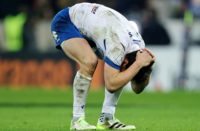By Brendan Gallagher
A few months back this column highlighted the fact that rugby is not as immune from doping issues as it likes to think and for some reason details of bans and failed tests don't attract the same negative publicity as in other sports. Nor are we as curious about long medical treatments as perhaps we should be.
I resolved, when possible, to shine a light more often on this subject and, hey presto!, in just the last couple of weeks we have had three stories concerning doping, alleged doping and the worrying use of a medicinal arsenal to combat chronic injury by a high profile Australian international.
First came the four-year ban for Yorkshire Carnegie's South African flanker Brandon Staples, who was found guilty of using a cocktail of three different steroids after testing positive for dehydrochloromethyl-testosterone, metandienone and stanozolol during out of season testing at training on August 9 last year.
Staples claimed the positive test must have been the result of nutritional drinks he had been using while back in South Arica on holiday.
After the ban had been confirmed Stephen Watkins, RFU anti-doping and illicit drugs programme manager commented: “This is the first failed test for a performance-enhancing substance in English professional rugby since 2011 and a reminder to all that we cannot be complacent in our efforts to keep rugby a clean sport.
“Ultimately individuals are responsible for what they put into their bodies and this case highlights what can happen if a player is not vigilant.”
An isolated case seemed to be the implied verdict yet a few days later came the news that another South African flanker – the much higher profile Ashley Johnson at Wasps – had been provisionally suspended after testing positive for a prohibited substance – understood to be a diuretic – in out of competition training on February 7.
Diuretics can be used to aid weight loss and also mask the use of other drugs. The case is on-going with Wasps and the player investigating the possible source of the banned substance. As Watkins said though, ultimately it is the athlete who is responsible for what he puts into his body.
Then came an alarming Instagram posting from James O'Connor, the Australian wing at Sale, earlier this week detailing the treatment he has undertaken during the last two years with Toulon and then Sale as he attempts to overcome a chronic ankle injury.
O'Connor revealed that he has been able to play only intermittently despite a regime of injections into the injured joint. While at Toulon, and I quote from his Instagram posting: “It got to the point where I was only training one session a week and injecting it with local anaesthetic just to be able to take the field.
“At the time I knew this wasn't in my body's best interest but I was so determined to play and win a final with Toulon that I disregarded all the signs and carelessly played on. I ended up getting the reconstruction five days after losing that final and moved across to Sale Sharks to start fresh.”
Meanwhile at Sale: “I masked the pain through various means and just got on with the job. I did whatever I could to get onto the field to play… three games on, two weeks off and cortisol (a steroid hormone) to PRP injections (platlet rich plasma) became my routine! This pressure in no way came from the club. I thought I could beat this through force and never actually allowed myself to stop and heal correctly.”
That might all be above board although rugby needs to tread carefully when it comes to painkilling injections, cortisone and blood manipulation but what is surprising is that the sports ethics police – of whom there suddenly seem to be hundreds dotted around the place – haven't been kicking up a storm.
Cyclists have been hung drawn and quartered and had their reputations shredded for their use – officially approved and sanctioned in advance by their Governing bodies – of medication and injections to overcome a chronic condition or illness and get to the line, so called performance enablers. It's a very tricky line that rugby is treading here and indeed has been treading for decades and decades.
Attention should also be given to that rather odd quoted line from O'Connor about the pressure (to medicate and inject) “in no way coming from the club”– the strong implication therefore being that it was self-generated.
Everybody in the game knows and accepts that O'Connor has been seriously injured and, of course, he wants to get back to full fitness, but players must never be allowed to take the lead in medical matters. That's the first step down a very dangerous road.


























